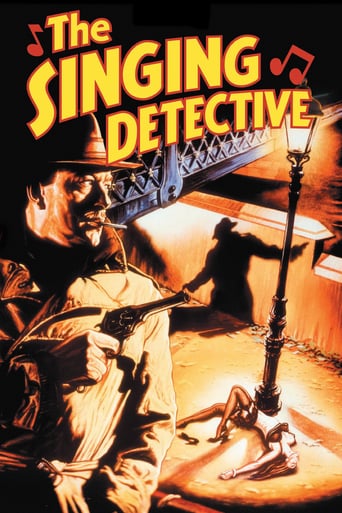pontifikator
This is one of the two best mini-series I've seen.* It has excellent casting, excellent photography, even excellent sound. And the script, by Dennis Potter, is amazing. I'd say there are three or four master's theses in that script for those who are into such things. The series stars Michael Gambon, Janet Suzman, and Patrick Malahide as the major characters, but the supporting cast is one of the best I've seen."The Singing Detective" follows some days in the life of one Philip E. Marlow, the writer of cheap detective novels. Marlow has psoriasis, a skin disease that renders him incapable of motion, keeping him in constant pain and delirium. Marlow drifts in and out of cogency, and we follow his delirious dreams and waking life. In his dreams, Marlow has cast himself as the title character in his first novel, called -- wait for it -- "The Singing Detective." Because Marlow is truly delirious, we can't always tell when what we're seeing is actually happening and what is a part of Marlow's delusion. Interspersed with his delusions from the novel are flashbacks to Marlow's childhood in a rural English village, where his father was a coalminer. While Marlow is in the hospital, he's seen by various doctors, cared for by various nurses, and is seen by a psychiatrist. All of these seens (er, scenes) take on a life of their own, with some of the actors playing several characters. The issues Marlow is dealing with include whether his psoriasis is self-induced, the suicide of his mother (used in his novel "The Singing Detective"), his feelings about sexual intercourse, and his feelings about writing trashy novels instead of literature.Potter breaks down the usual wall between plays/movies and the audience by having his characters address the audience directly. In addition, the character Marlow, played by Gambon, plays the titular singing detective, Marlow's mother plays a German spy, and the actor Malahide plays more characters than I could keep track of. In the novel, a woman commits suicide by jumping off a bridge, and her face is revealed several times, but there are three actresses portraying the dead body, including Marlow's mother.Additionally, fictional characters from his novel interact with Marlow and other purportedly real characters from Marlow's purportedly real life. And two of the fictional characters step into meta-roles, addressing the fictionality of their existence, addressing the facts that they don't even have names and are there just to stand around. They confront the "real" Marlow and attempt to kill him, resulting in a gunfight in the hospital, where the fictional Marlow as the singing detective murders the "real" Marlow, his author. Potter had some very serious problems, and they tumble out helter-skelter in this mini-series.Dennis Potter was born in the Thirties and died in 1994 from panchreatic cancer. Potter hated Rupert Murdoch and named his fatal cancer Rupert. In 1962, Potter was diagnosed with psoriatic arthropathy, which not only caused horrible, debilitating lesions on his skin (worse than was shown on Marlow), but crippling arthritis. His hands were reduced to clubs, and he continued to write by taping a pen to his hand. It may be that the drugs used to treat his disease caused the panchreatic cancer.Potter has written about his sexual abuse by a relative when Potter was a child, and he seems to have been disgusted by sex the rest of his life. Although he denies his works are autobiographical, it's very clear he draws much of his writing from personal experiences. Several scenes in "The Singing Detective" show characters dealing badly with sexual intercourse.The series was directed by Jon Amiel, and he did a marvelous job. The music for the series was chosen from Thirties and Forties classics, and I recommend listening to the series with your best sound system.Potter also wrote the mini-series "Pennies from Heaven," starring Bob Hoskins, which I also recommend. "Pennies from Heaven" is darker than "The Singing Detective." I haven't seen the film version with Steve Martin. Some of the aggravation of Potter's writing the screenplay for MGM spills over into "The Singing Detective."*The other is "Tinker,Tailor, Soldier, Spy."
editor-316
All I can say about this movie is that it is the best -- from the screenplay to the cinematography to the choreography to the acting -- this movie is the best! It's got it all -- from irony to bathos.Knowing nothing of the plot, it was just a bit hard to get into. But by the time I had watched 15 minutes, I was hooked. It took me a while (all right, over an hour) to understand the flashbacks and the surrealism (come to think of it, that element is rather similar to what the Coen Brothers did in their masterpiece Barton Fink) but when I did sort out the real from the surreal and the present from the past, I was overcome with admiration.It's visually gorgeous; the music is luscious; the pacing is perfect ... The Singing Detective is glorious, a splendiferous accomplishment.See it ASAP!
FlickMan
Apparently this is a "cult" movie (OK, miniseries) like Rocky Horror or Repo Man. There's a small group of people who love it and think it's the greatest thing ever, while most of the world is blissfully unaware of its existence. A friend lent me a copy, and I really couldn't get into it. It's just too oblique. There's tons of stuff going on, on all sorts of levels, but somehow I didn't care. The production quality is mediocre at best, and the main character, Marlow, is not all that likable. There are some great moments -- like when the hospital doctors burst into a rousing rendition of "Dem Bones" -- but mostly it just meanders along, zig-zagging between past and present, reality and fantasy. If you want to watch a surreal movie, I recommend "Brazil" over this, any day!



